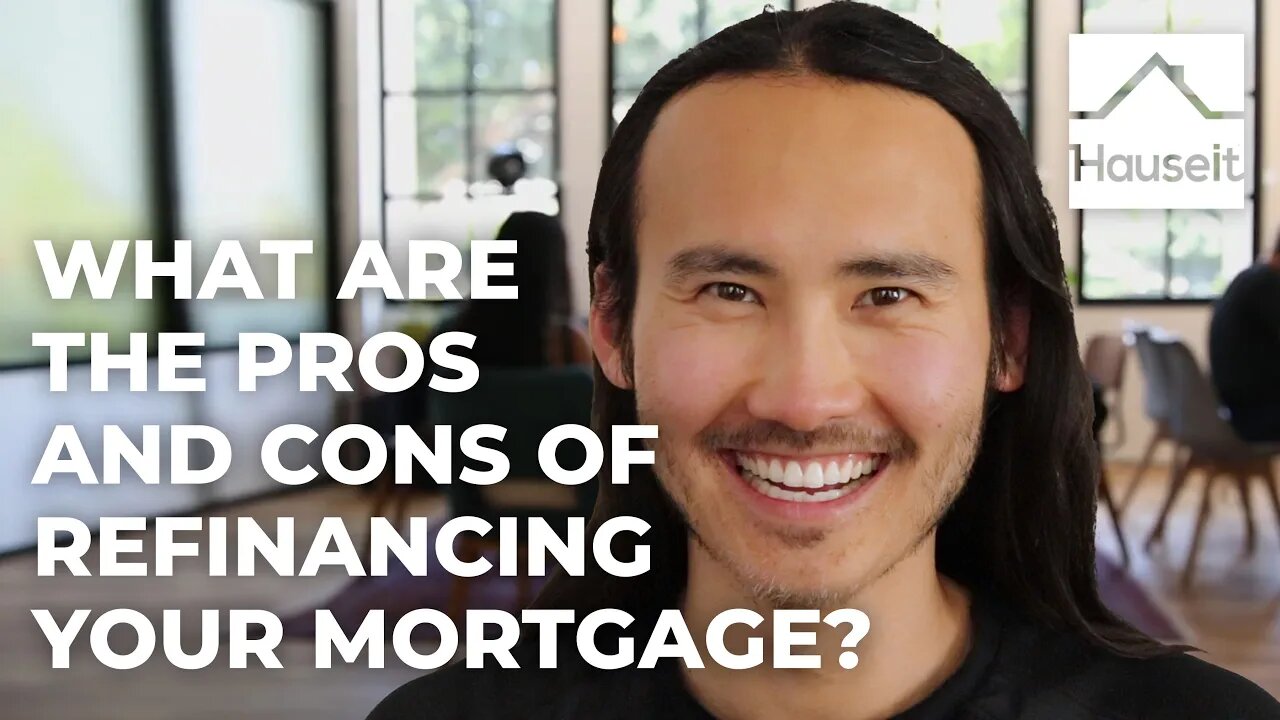Premium Only Content

What Are the Pros and Cons of Refinancing Your Mortgage?
Calculate Your Buyer Closing Costs in NYC: https://www.hauseit.com/closing-cost-calculator-for-buyer-nyc/
Save 2% When Buying in NYC: https://www.hauseit.com/hauseit-buyer-closing-credit-nyc/
What are the pros and cons of refinancing your mortgage and should you do so or wait? We will demystify this topic in the following video. My name is Chris at Hauseit. In case you're not familiar with the platform, Hauseit is the largest For Sale by Owner and Buyer Commission Rebate company in New York City, established in 2014. You can learn more about how to save money when you're buying and selling property as well as closing costs at https://www.hauseit.com.
One of the most significant pros of deciding to refinance your mortgage is to take advantage of lower interest rates. For example, let's say you've got a 30-year mortgage 15 years ago where interest rates were much higher and let's say that your fixed interest rate is 6%. Well if the average 30-year fixed-rate today is only 3.5% well and you have 15 years left in your mortgage then it makes a dramatic amount of sense to refinance. Essentially this more significant the rate drop and the longer you'll be able to take advantage of the lower interest rate savings the better and the more worthwhile it is to refinance your mortgage, another great reason to refinance your mortgage or at least to consider it is.
If you have an adjustable rate mortgage with an interest only feature or a fixed interest rate teaser rate for a number of years, typically five to ten years, at the end of these five to ten years your interest only feature may expire, meaning you will then have to pay principal payments over the life of the term. Typically the original term of the note will still be 30 years so if you pay interest only let's say in the first ten years well then the remaining 20 years you'll have to amortize the entire mortgage balance. This can be quite a surprise for borrowers if all of a sudden they have to pay not only just their interest but also principal payments that might be larger than it additional thirty year alone because remember the entire balance is being fully amortized over 20 years.
In our example, another thing to keep aware of is the fixed or teaser rate structure of many adjustable rate mortgages. Many adjustable rate mortgages will have an initial teaser rate that is lower than what the current market pricing is. For example for the first 5 to 10 years the initial teaser or fixed interest rate might be significantly lower maybe by half a point then the current 30-year mortgage interest rate. However at the end of this teaser period say after five to ten years then the interest rate becomes floating according to an interest plus a margin. The interest rate when it becomes floating typically adjusts every year it is based off of a commonly used index such as one year LIBOR which is published in The Wall Street Journal and many other sources plus usually a margin.
For example 2.5% so hypothetically if your loan were to become floating today and that's a one year LIBOR is around 2% today and your margin is 2.5%. Well in that case your interest rate for this year because it resets yearly would be approximately 4.25% versus an initial teaser rate that may have been significantly lower such as 2.6%. As you can imagine the prospect of an interest only or a teaser rate period expiring soon is a great incentive for a borrower to wish to refinance his or her mortgage.
If you simply don't have the cash flow or the wherewithal to begin significantly heavier monthly payments well then it may make sense to take a punch and absorb any costs and fees associated with refinancing and essentially extend your loan. So what are the cons of refinancing a mortgage? The primarily the reason is cost. If you think about, it banks have to earn something or have an incentive to allow you to refinance especially if it's going to be at a lower interest rate. Well this in charge fees as we discuss in another video for example the cost to refinance a approximately $700,000 mortgage maybe around one point or 1% so you'll have to factor this into your decision-making on whether it makes sense to refinance at all other reasons for why you should perhaps consider not refinancing your home or if you plan to move in the near future.
Say in the next 1 or 2 years and you as a result may decide to sell your home if you are going to be selling your home in the next one to two years and even if your interest rate resets higher then it may well make sense to not pay those costs and fees of refinancing and stomach the higher rates for a brief period before selling your home altogether.
Save 2% When Buying in NYC: https://www.hauseit.com/hauseit-buyer-closing-credit-nyc/
.
.
Hauseit LLC, Licensed Real Estate Broker
Tel: (888) 494-8258 | https://www.hauseit.com
_
#hauseit #hauseitnyc
-
 8:30
8:30
Chrissy Clark
13 hours agoBehind The Scenes Of Trump’s Inauguration🇺🇸 I Vlog
25.1K7 -
 1:06:05
1:06:05
PMG
12 hours ago $3.80 earned"What the FDA is Hiding About Nicotine Will SHOCK You w/ Dr. Ardis"
12.6K9 -
 23:15
23:15
The Based Mother
13 hours ago $1.57 earnedHOLY BLASPHEMY! Trump vs. Episcopal Bishop Budde at the National Cathedral in DC
7.97K43 -
 14:20
14:20
RealitySurvival
12 hours agoDrug Cartels Designated As Foreign Terrorist Organizations
6.59K8 -
![[Ep 591] Shock & Awe! Trump is Back! | Guest: Sam Anthony of [Your]News](https://1a-1791.com/video/fwe2/5c/s8/1/G/I/i/0/GIi0w.0kob-small-Ep-591-Shock-and-Awe-Trump-.jpg) 3:16:13
3:16:13
The Nunn Report - w/ Dan Nunn
1 day ago[Ep 591] Shock & Awe! Trump is Back! | Guest: Sam Anthony of [Your]News
29.4K8 -
 3:21:30
3:21:30
CharLee Simons Presents Do Not Talk
1 day agoDO NOT TALK with SIMONE ANDERSON, & MIKE COOK (World Collapse. Are You Ready?)
15.4K8 -
 1:38:35
1:38:35
FreshandFit
12 hours agoDecoding Lily Phillips' Lies Through An RP Lense!
78.1K31 -
 1:39:03
1:39:03
Benny Johnson
11 hours ago🚨 Trump Live Right Now From Oval Office in First Fox News Interview as President | ‘Watch This…’
191K222 -
 2:10:04
2:10:04
Barry Cunningham
13 hours agoLIVE WATCH PARTY: PRESIDENT TRUMP INTERVIEW WITH SEAN HANNITY!
73.2K28 -
 1:37:19
1:37:19
Glenn Greenwald
16 hours agoAs Trump Vows to Restore Free Speech, Harvard Just Assaulted It; Columbia Professor Forced Out Over Israel Criticisms | SYSTEM UPDATE #394
110K212